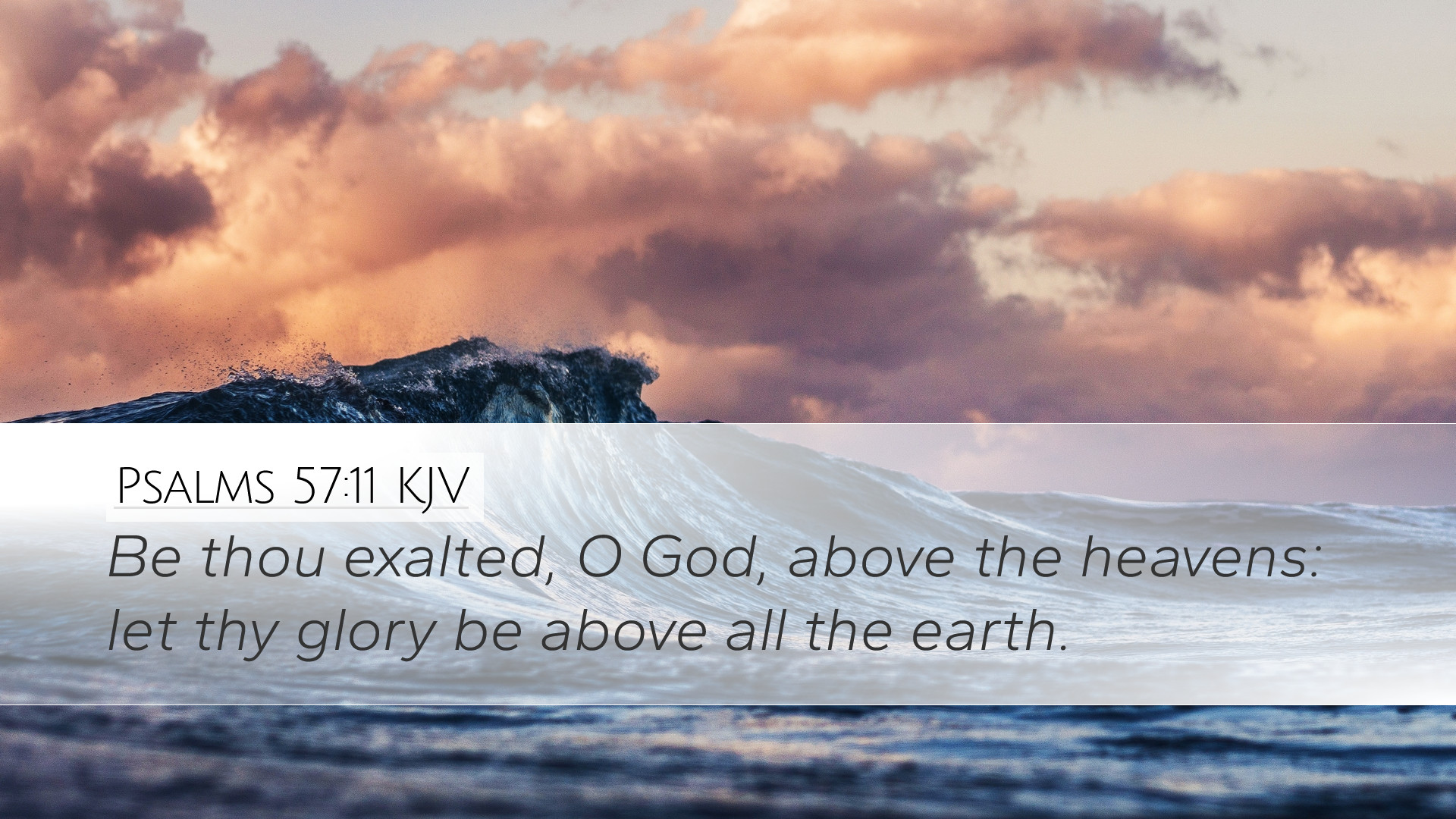Commentary on Psalms 57:11
Psalms 57:11 (KJV): "Be thou exalted, O God, above the heavens; let thy glory be above all the earth."
Introduction
The verse encapsulates a heartfelt appeal for God's exaltation and glory. In this succinct prayer, the psalmist expresses a desire for God’s name and reputation to be lifted above the heavens and recognized throughout the earth. This commentary synthesizes insights from public domain commentaries, offering depth and reflections valuable for pastors, students, theologians, and scholars.
Contextual Background
Psalms 57 is attributed to David and is believed to have been written while he was fleeing from Saul, hiding in a cave. This setting emphasizes the psalmist's desperation and reliance on God amidst perilous circumstances. Understanding the historical context helps illuminate the profound sense of urgency and faith in the prayer offered in verse 11.
Exegesis of the Verse
The verse can be broken down into two major petitions:
- Exaltation of God: "Be thou exalted, O God, above the heavens;"
- Manifestation of Glory: "let thy glory be above all the earth."
Exaltation of God
The psalmist’s plea for God’s exaltation reflects an understanding of the divine nature. According to Matthew Henry, this exaltation relates not only to God’s intrinsic glory but also to His sovereign reign. The heavens serve as God's throne, and the psalmist, while in distress, appeals to God to manifest His majesty amidst adversity.
Albert Barnes highlights the significance of recognizing God’s sovereignty, suggesting that when God is exalted, all worldly troubles diminish in comparison. The exclamation carries a tone of worship that is both an acknowledgment of God’s power and a desire for its full manifestation in the world.
Manifestation of Glory
The second part of the verse, “let thy glory be above all the earth,” emphasizes the universal recognition of God’s splendor. Adam Clarke notes that the psalmist seeks to see God’s glory—indicating not only the beauty of His attributes but also the revelation of His active presence in the affairs of mankind. The desire for glory to be seen above all the earth implies a yearning for God’s responses to the cries of His people during their suffering.
This part of the verse also draws attention to the relationship between divine glory and human acknowledgment. As the glory of God rises above the earth, it serves as an invitation to humanity to witness and respond to the divine work. Barnes further elaborates that the manifestation of God’s glory can be realized in nature, in providence, and most significantly through the person of Jesus Christ, when toned through the lens of the New Testament.
Theological Implications
This verse encapsulates several significant theological themes:
- The Sovereignty of God: The exaltation of God suggests His ultimate authority over creation, affirming that nothing is beyond His control.
- The Nature of Worship: The psalmist's invocation encourages believers to continually elevate God in their hearts and lives, seeking to glorify Him above all else.
- The Hope of Divine Intervention: In moments of despair, the prayer acts as a reminder that God's glory is the beacon of hope for the faithful.
Applications for Today
Oftentimes, believers may find themselves in desperate situations, akin to David in a cave, battling personal giants. The call to exalt God above our circumstances serves as a powerful reminder of perspective:
- Personal Reflection: Examine areas in life where God may not be receiving the glory due to Him. Identifying these points can lead to transformative growth.
- Corporate Worship: The church can reflect on the importance of collectively lifting God’s name in praise, prioritizing His glory above all other agendas.
- Outreach and Mission: Recognizing God’s glory demands action; believers are called to make His glory known to all nations, as a testament to His supremacy and grace.
Conclusion
Psalms 57:11 serves as a robust declaration of faith in God's sovereignty and glory, urging believers to focus their hearts and minds on exalting God above every concern. Drawing from the insights of Matthew Henry, Albert Barnes, and Adam Clarke, this verse encourages a response that is both worshipful and action-oriented. As scholars, pastors, and students reflect on this poignant scripture, may they be propelled toward a deeper exaltation of God in their lives and ministries.


